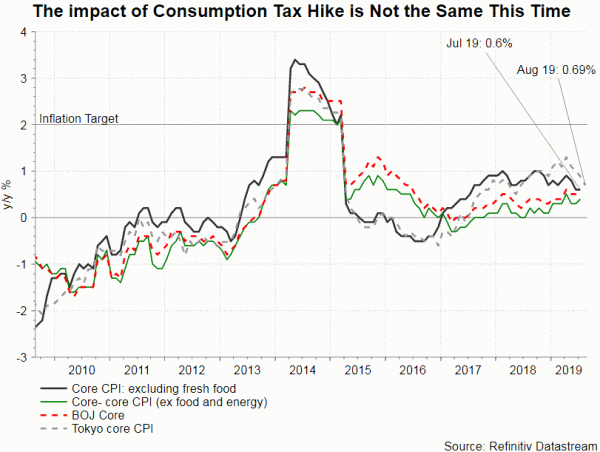japan’s inflation has stayed very weak. Despite hopes that the upcoming increase in consumption tax could boost the general price levels, the impact this time is likely limited.
Tokyo CPI signals that Japan’s inflation outlook remains dismal.Although consumption tax hike in October might boost inflation, the impact is expected to be short-lived and should not alter the picture of weak inflation. Tokyo’s core CPI eased to +0.7% y/y in August, from +0.9% a month ago. Meanwhile, the core-core CPI steadied at +0.6% y/y during the month. In July, nationwide core CPI stabilized at +0.6% while core-core CPI climbed slightly higher to +0.4%. The country’s inflation has been very soft in whatever measures, despite BOJ’s stimuli measures.
The definitions of different inflation gauges in Japan are somehow different from other advanced economies. Its core CPI only excludes fresh food items but includes energy. As such, it is more relevant to compare this to headline CPI in other countries. Meanwhile, Japan’s core-core CPI excludes both food and energy items. It is more relevant to compared this with core CPI in other countries. One more gauge that BOJ refers to is the so-called BOJ- core. Introduced in 2015, the index excludes fresh food and energy but includes some other food prices. BOJ suggested fresh food and energy prices, rather than processed food, are volatile items. Exclusion of all food items in core-core CPI has understated the country’s inflation level. Yet, the redefinition of inflation has garnered criticism that BOJ intended to artificially boost the inflation readings.
Consumption Tax Hike Unlikely to Boost Inflation Much
Consumption tax hike in October is a done deal. Following an increase to 8% from 5% in 2014, consumption tax is expected to increase further to 8%, effective October 1. The key is how this would affect household spending, hence, inflation. Recall that in 2014, shortly after the government raised tax rate to 8% from 5% previously, official core inflation rallied to 23-year high of 3.4% y/y in May, while core- core also rose to +2.2%. These were the rare time over the past decades that the country’s inflation exceed the +2% target. However, inflation fell below +1% again a year after as the effect of tax hike dissipated.
There are several differences between the upcoming increase October and the one occurred in 2014. First, the size of increase is 2 percentage points, compared with +3 percentage points back then. Indeed, the percentage of increase is 25% this time and 60% in 2014. Second, a relief package will be implemented to offset of tax burden. The consumption tax hike, together with revisions on income tax, cigarette duty and reduction on social security benefits, should increase government revenue (and households’ financial burden) by around 5.7 trillion yen. At the same time, the government’s tax exemption on food, etc. should offset the burden by around 1.1 trillion yen. Moreover, an economic package (including free pre-school education, free secondary education and other social security benefit) worth of 2.3 trillion yen would be implemented. On net, the increase in burden would be around 2.3trillion yen. Back in 2014, the government initially planned to increase tax rate further from 8% to 10% in October 2015. This had caused consumers to front-load their purchases, before cutting back after the hike. The front-loaded purchases should be much limited this time.

